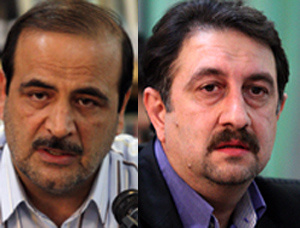An Analysis of the Middle East Peace Process

Dr. Mohammad-Ali Mohtadi delivered the first speech titled “A Historical View of the Arab-Israeli Conflict”. He presented a historical narration on the development of the Middle East’s biggest challenge which began with the start of Jewish immigration to Palestine in the late 19th century, and how it developed into the present situation while resulting in various wars between the Arabs and Israel, including the 1948 and 1967 ‘Six Day’ wars.
The next speaker, Iran’s former ambassador to Libya Hossein Jaber-Ansari, focused on the internal developments of Palestine and Israel with a focus on the ongoing negotiations. Jaber-Ansari gave an account of the three existing gaps among Palestinians, namely the geographical, ideological and strategic gaps. The different attitudes of Palestinian residents of Gaza and the West Bank, the approaches of nationalist (Pan-Arabist), Islamist and leftist factions of the Palestinian movement, and the rift between pro-resistance and pro-reconciliation camps were the main focus of his presentation. Jaber-Ansari also discussed the gaps in opinion among Israeli citizens, rooted in their attitude towards Judaism and Zionism, their preferred economic school (Socialism/Capitalism), and their origins (Sephardi/Ashkenazi).
Mohammad Irani, Tehran’s former ambassador to Lebanon, was the next speaker at the conference. His speech, titled “Iran and the Problem of Palestine”, addressed the attitudes of Iranian citizens and ruling regimes to the Palestinian cause. Irani maintained that unlike during the Pahlavi era, since the 1979 Islamic Revolution there has been an overlap between the attitude of the ruling system and Iranian citizens in support of the Palestinian cause, though during recent years, doubts have emerged, mostly among intellectuals, on the rationale of supporting Palestinians or other Arab nations and provoking Israel.
He also referred to Mohammad Khatami’s proposal, presented in the 9th Organization of Islamic Conference Summit in Doha, in which Khatami had set forth a four-stage plan for solving the Palestine-Israel conflict. Mohammad Irani called for a ‘smarter’ approach to the Palestinian cause, and stated that Iran should not be known as the cause of a rift between Palestinian factions. He also made suggestions for further proximity between Iran and Palestinians.
The last speaker, Dr. Hossein Salimi, professor of Allameh Tabatabae’i University, gave an account of the impact of the international order’s development on the Palestinian issue in a speech titled “Palestine, Symbol of the International Order’s Influence”. Britain’s domination over global affairs (and its later diminishing influence), the emergence of the Cold War, marginalization of the two-state solution (and the ensuing Israeli shift into becoming a symbol of US influence in the region), the early 1970s détente between the US and the Soviet Union and the US and China, the dissolution of the USSR and the return of the two-state solution (which culminated in the formation of the Palestinian Authority), were turning points which have influenced the present state of the Palestine-Israel conflict, according to Salimi. He added that in the current era, the increasing interdependence of economies and interests has affected the attitude of the global media toward the Palestinians, bringing them further empathy from international institutes and adding to the pressure on Israel.
Salimi ended his speech with posing four questions for further contemplation: How can we use the global consensus to solve the problem of Palestine? Can all the goals of the Palestinian nation be achieved at once, or there should be a sort of prioritization? Does support for Palestine mean support for certain Palestinian groups? Is the issue of Palestine an ideological or humanitarian concern? And how can we tie Iran’s national interests to the Palestinian cause?
A question and answer session was held after the speeches.

